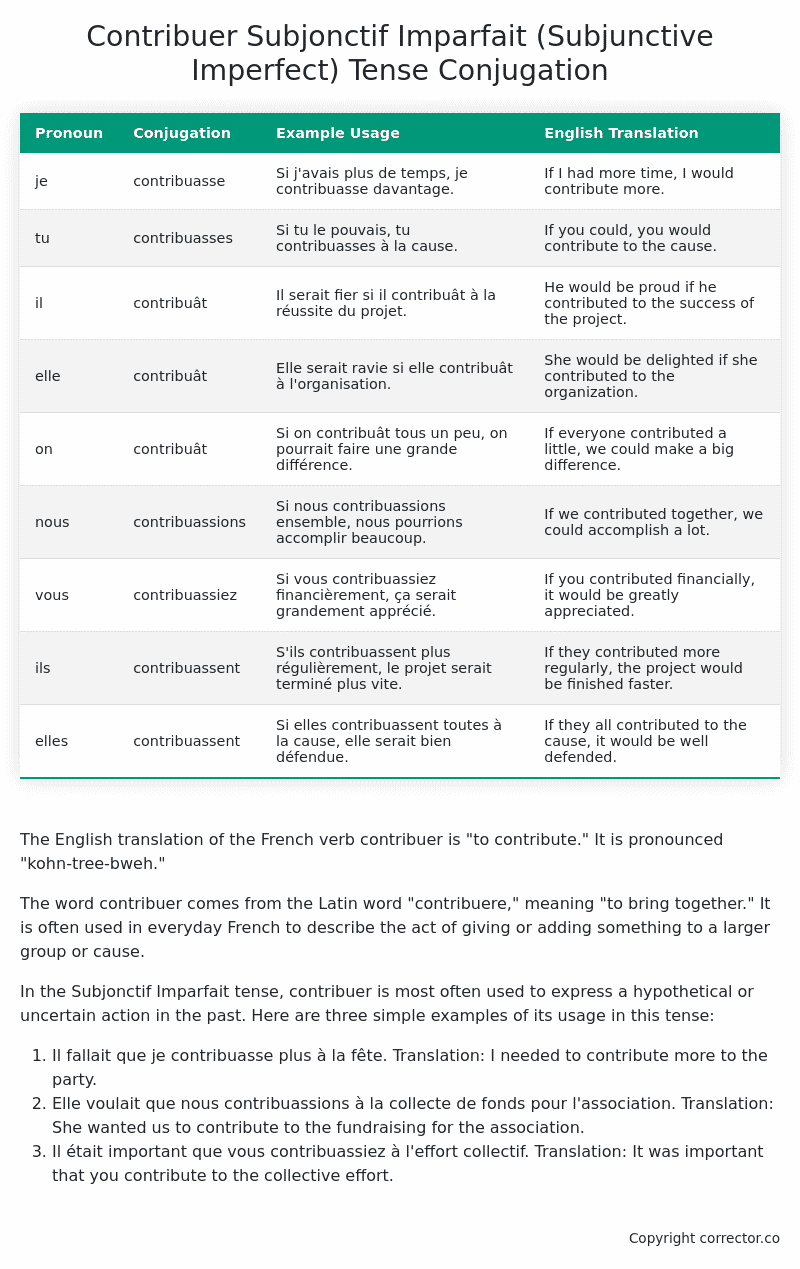Subjonctif Imparfait (Subjunctive Imperfect) Tense Conjugation of the French Verb contribuer
Introduction to the verb contribuer
The English translation of the French verb contribuer is “to contribute.” It is pronounced “kohn-tree-bweh.”
The word contribuer comes from the Latin word “contribuere,” meaning “to bring together.” It is often used in everyday French to describe the act of giving or adding something to a larger group or cause.
In the Subjonctif Imparfait tense, contribuer is most often used to express a hypothetical or uncertain action in the past. Here are three simple examples of its usage in this tense:
- Il fallait que je contribuasse plus à la fête. Translation: I needed to contribute more to the party.
- Elle voulait que nous contribuassions à la collecte de fonds pour l’association. Translation: She wanted us to contribute to the fundraising for the association.
- Il était important que vous contribuassiez à l’effort collectif. Translation: It was important that you contribute to the collective effort.
Table of the Subjonctif Imparfait (Subjunctive Imperfect) Tense Conjugation of contribuer
| Pronoun | Conjugation | Example Usage | English Translation |
|---|---|---|---|
| je | contribuasse | Si j’avais plus de temps, je contribuasse davantage. | If I had more time, I would contribute more. |
| tu | contribuasses | Si tu le pouvais, tu contribuasses à la cause. | If you could, you would contribute to the cause. |
| il | contribuât | Il serait fier si il contribuât à la réussite du projet. | He would be proud if he contributed to the success of the project. |
| elle | contribuât | Elle serait ravie si elle contribuât à l’organisation. | She would be delighted if she contributed to the organization. |
| on | contribuât | Si on contribuât tous un peu, on pourrait faire une grande différence. | If everyone contributed a little, we could make a big difference. |
| nous | contribuassions | Si nous contribuassions ensemble, nous pourrions accomplir beaucoup. | If we contributed together, we could accomplish a lot. |
| vous | contribuassiez | Si vous contribuassiez financièrement, ça serait grandement apprécié. | If you contributed financially, it would be greatly appreciated. |
| ils | contribuassent | S’ils contribuassent plus régulièrement, le projet serait terminé plus vite. | If they contributed more regularly, the project would be finished faster. |
| elles | contribuassent | Si elles contribuassent toutes à la cause, elle serait bien défendue. | If they all contributed to the cause, it would be well defended. |
Other Conjugations for Contribuer.
Le Present (Present Tense) Conjugation of the French Verb contribuer
Imparfait (Imperfect) Tense Conjugation of the French Verb contribuer
Passé Simple (Simple Past) Tense Conjugation of the French Verb contribuer
Passé Composé (Present Perfect) Tense Conjugation of the French Verb contribuer
Futur Simple (Simple Future) Tense Conjugation of the French Verb contribuer
Futur Proche (Near Future) Tense Conjugation of the French Verb contribuer
Plus-que-parfait (Pluperfect) Tense Conjugation of the French Verb contribuer
Passé Antérieur (Past Anterior) Tense Conjugation of the French Verb contribuer
Futur Antérieur (Future Anterior) Tense Conjugation of the French Verb contribuer
Subjonctif Présent (Subjunctive Present) Tense Conjugation of the French Verb contribuer
Subjonctif Passé (Subjunctive Past) Tense Conjugation of the French Verb contribuer
Subjonctif Imparfait (Subjunctive Imperfect) Tense Conjugation of the French Verb contribuer (this article)
Subjonctif Plus-que-parfait (Subjunctive Pluperfect) Tense Conjugation of the French Verb contribuer
Conditionnel Présent (Conditional Present) Tense Conjugation of the French Verb contribuer
Conditionnel Passé (Conditional Past) Tense Conjugation of the French Verb contribuer
L’impératif Présent (Imperative Present) Tense Conjugation of the French Verb contribuer
L’infinitif Présent (Infinitive Present) Tense Conjugation of the French Verb contribuer
Struggling with French verbs or the language in general? Why not use our free French Grammar Checker – no registration required!
Get a FREE Download Study Sheet of this Conjugation 🔥
Simply right click the image below, click “save image” and get your free reference for the contribuer Subjonctif Imparfait tense conjugation!

Contribuer – About the French Subjonctif Imparfait (Subjunctive Imperfect) Tense
Formation
Common Everyday Usage Patterns
Interactions with Other Tenses
Subjonctif Présent
Indicatif Passé Composé
Conditional
Conditional Perfect
Summary
I hope you enjoyed this article on the verb contribuer. Still in a learning mood? Check out another TOTALLY random French verb conjugation!


